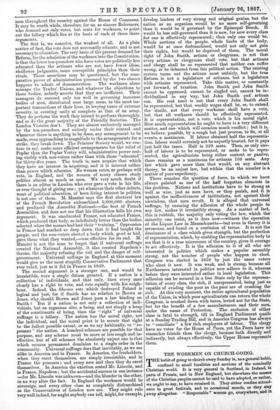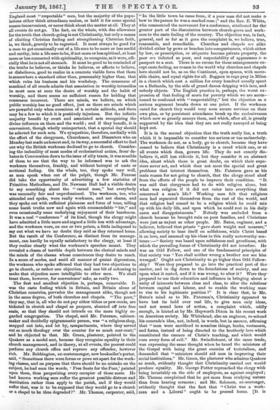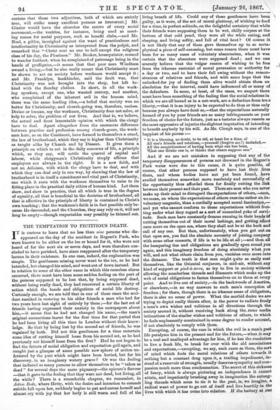THE WORKMEN ON CHURCH-GOING.
THE habit of going to church every Sunday is, as a general habit, confined to small localities and sections of the nominally Christian world. It is very general in Scotland, in Ireland, in parts of Prussia, and in New England, but elsewhere the masses of the Christian peoples cannot be said to have adopted, or rather, we ought to say, to have retained it. They either confine attend- ance to great festivals, and to occasional moods, or they stay away altogether. "Respectable" women go, everywhere, and in, England most " respectable " men, but the majority of the popn- lations either think attendance useless, or hold it for some special reason inconvenient, or never think about the matter at all. They at all events do not go. The fact, on the whole, with due allowance for the truth that church-going is not Christianity, but only a means of eliciting Christian feeling and strengthening Christian faith, is, we think, gravely to be regretted. It must always be good for a man to get occasionally out of a life sure to be more or less sordid and earthy, into a life sure to be, if not more or less spiritual, at least more or less connected with spirituality, to recognize, as it were, offi- cially that lie is not all stomach. It must be good to be reminded of the truths he believes, or thinks he believes, or affects to believe, or disbelieves, good to realize in a concrete visible form that there is somewhere a standard other than, presumably higher than, that which rules his business and his workshop. The consensus of mankind of all creeds admits that association in worship intensifies in most men at once the desire of worship and the habit of worship, and there seems no sufficient reason for holding that consensus incorrect. There are minds, we believe, on which public worship has no good effect, just as there are minds which are powerful only when conscious of 'S certain solitude, and there may be a few to which it is positively injurious. But the infinite majority benefit by overt and associated acts recognizing the divine influence on them and the world ; and if they benefit, it is convenient, though wholly unimportant, that a special day should be selected for such acts. We sympathize, therefore, cordially with the effort of the clergymen, Churchmen, and Dissenters who on Mondaylast made anhonest and, in its way, a successful effort to find out why the British workman declined to go to church. Consider- ing the imbecility of most modes of ecclesiastical action, from• de- bates in Convocation down to the issue of silly tracts, it was sensible of them to see that the way to be informed was to ask the workmen themselves, frankly, and without betrayal of caste or sectional feeling. On the whole, too, they spoke very well, as men speak when out of the pulpit, though Mr. Penrose did take the opportunity of advertising a few statistics of Primitive Methodism, and Dr. Newman Hall had a visible desire to say something about the " carnal man," but everybody was unusually fair and unprofessional. The workmen, too, who attended and spoke, were really workmen, and not shams, and they spoke. out with sufficient plainness and force of tone, telling some harsh truths now and again with commendable " bir," and even occasionally some underlying enjoyment of their harshness. It was a real " conference " of its kind, though the clergy might have admitted a little more and argued a little less with advantage, and the workmen were, on one or two points, a little indisposed to say out what we have no doubt they said as they returned home. But the result of the Conference, as distinct from its manage- ment, can hardly be equally satisfactory to the clergy, at least if they realize • clearly what the workmen's speeches meant. They revealed a chasm of terrible depth between the clerical minds and the minds of the classes whose consciences they desire to reach. In a score of modes, and amid all manner of quaint digressions, the workmen who spoke affirmed that they had two objections to go to church, or rather one objection, and one bit of colouring to make that objection more intelligible to other men. We shall treat them, however, for convenience' sake, as really two.
The first and smallest objection is, perhaps, removable. It was the caste feeling which in Britain, and Britain alone of Christian countries, pervades the management alike, though not in the same degree, of both churches and chapels. " The poor," they say, that is, all who do not pay either tithes or pew-rents, are ticketed in church and chapel as paupers, shunted off into free seats, so that they should not intrude on the more highly re- garded congregation. The chapel, said Mr. Paterson, cabinet- maker and decidedly epigrammatic person, was " a religious shop, mapped out into, and let by, compartments, where they served out so much theology over the counter for so much seat-rent;" and he objected to that. Mr. Green, plasterer, pointed to the Quakers as a model sect, because they recognize equality in their church management, and in theory, at all events, the poorest could perform any church office and reprove any offender, however rich. Mr. Bebbington, ex-costermonger, now bookseller's porter, said, "Sometimes there were forms or pews set apart for the work- ing classes, and on purpose that there should be no mistake on the subject, he had seen the words, Free Seats for the Poor,' painted upon them, thus pauperizing every occupier of those seats. He had known working men suffer the greatest possible distress and destitution rather than apply to the parish, and if they would suffer that, was it to be supposed that they would go to a church or a chapel to be thus degraded ?" Mr. Thomas, carpenter, said,
" In the little town he came from, if a poor man did not make a? bow to the parson he was a marked man ;" and the Rev.. E. White, who commenced the movement for a conference, attributed far the greater part of the dissociation between church-goers and work- men to the caste feeling of the country. The objection was, in fact, general, and so far as it goes the complaint is, we believe, true, reasonable, and remediable. Churches and chapels are alike divided either by pews or benches into compartments, which either by law, or prescription, or etiquette become private property, the poor are ticketed as poor, and respectability of appearance is so passport to a seat. There is no excuse for these arrangements ex- cept caste feeling, no reason in the world why churches and chapels here should not be, as on the Continent, open spaces, with move- able chairs, and equal rights for all. Beggars in rags pray in Milan.. in a church which coat a million for every hundred usually spent on a Bethesda, by the side of grand dames dripping with lace, and nobody objects. The English practice is, perhaps, the worst ex- pression of that feeling of acorn for poverty which we are accus- tomed to confound with "respectability," but the objection as &- serious argument breaks down at one point. If the workmen eared for church they would very soon secure services on their own plan, or by persistent attendance break up the exclusiveness which now so greatly annoys them, and which, after all, is greatly supported by the idea that they are not really annoyed at being kept out.
It is in the second objection that the truth really lies, a truth which it is impossible to consider too serious or too melancholy. The workmen do not, as a body, go to church, because they have- ceased to believe that Christianity is a creed which can, or at all events which does, govern life. They do not exactly dis- believe it, still less ridicule it, but they consider it an abstract idea, about which there is great doubt, on which their supe- riors never act, and which does not meet the special and great problems that interest themselves. Mr. Paterson gave as his main reason for not going to church, that the clergy stood aloof from the • efforts of the people to improve their condition. " It was said that clergymen had to do with religion alone, but what was religion if it did not enter into everything that concerned a man's life ? Working men felt that religious men had separated themselves from the rest of the world, and that religion had ceased to be a religion which he could mix up with his daily life, and upon which he could rest in his daily cares and disappointments." Nobody was excluded from a church because he brought ruin on poor families, and Christians were just as unjust as other people. Mr. Bates, engineer, and a believer, believed that priests "gave short weight and measure," allowing society to base itself on selfishness, while Christ based it on love, and summed up his ideas in this really noteworthy sen- tence :—" Society was based upon selfishness and greediness, with which the prevailing forms of Christianity did not interfere. He was an Odd Fellow, and one of the fundamental principles of• that society was You shall neither wrong a brother nor see him• wronged.' Ought not Christianity to go higher than Odd Fellow- ship? Were they prepared to go into the practical part of the matter, and to dig down to the foundations of society, and see. upon what it rested, and if it was wrong, to alter it? Were they r prepared to use their education and influence in bringing about a- unity of interests between class and class, to alter the relation'', between capital and labour, and to enable the working man- to rise to his legitimate position ?" It is clear that, to Mr. Bates's mind as to Mr. Paterson's, Christianity appeared to have lost its hold over real life, to give men only ideas, and not sound laws of action, a complaint which, oddly enough, is hinted at by Mr. Hepworth Dixon in his recent work on American society. Mr. Whitehead, also an engineer, re-echoed his comrade's idea, not, indeed, in words, but in essence, affirming that " men were sacrificed to senseless things, books, vestments, and forms, instead of being directed to the brotherly love which constituted the essence of Christ's teaching, and which would cure every form of evil." Mr. Swindlehurst, of the same trade, was expressing the same thought when he taxed the ministers of the Gospel with being the great enemies of teetotalism, and demanded that " ministers should aid men in improving their social institutions." Mr. Green, the plasterer who admires Quakers so much, evidently thought that Christianity carried out would produce equality. Mr. George Potter reproached the clergy with being invariably on the side of employers, as against employed ; Mr. Thomas complained that he got more from studying nature than from hearing sermons ; and Mr. Solomon, ex-scavenger, evidently thought that the fact that " Christ was a work- man and a Liberal" ought to be pressed home. [It is curious that those two adjectives, both of which are strictly true, will strike many excellent persons as irreverent.] Mr. Glazier would have the churches the centre of every social movement,—the vestries, for instance, being used as meet- ing rooms for social purposes, such as benefit clubs,—and Mr. Noel, a gilder, inveighed against the want of practicalness and intellectuality in Christianity as interpreted from the pulpit, and remarked that " Christ sent no one to hell except the religious class of his day, the Pharisees." Mr. Booker, housepainter, seemed to wander furthest, when he complained of patronage being in the hands of profligates,—it seems that that poor man Windham owned a living,—but he also really meant that Christianity must be shown to act on society before workmen would accept it ; and Mr. Franklyn, bookbinder, said the fault was, that Christianity was not brought into the shop, but left be- hind with the Sunday clothes. In short, in all the work- ing speakers, except one, who wanted oratory, and another, who complained of the inherent evil in the human mind, there was the same leading idea,—a belief that society was no better for Christianity, and church-going was, therefore, useless. Divine or human, say the workmen, Christianity does not solve, or help to solve, the problem of our lives. And that is, we believe, the actual and most lamentable opinion with which the clergy have to deal. Apart altogether from the enormous difference between practice and profession among church-goers, the work- men here, as on the Continent, have formed to themselves a creed, the law of brotherhood, which they say is higher than Christianity as taught alike by Church and by Dissent. It gives them a principle on which to act in the daily concerns of life, a principle which, as they say, will settle the quarrel of capital and labour, while clergymen's Christianity simply affirms that employers are always in the right. It is a new faith, and not an Atheism, with which the clergy have to deal, and with which they can deal only in one way, by showing that the law of brotherhood is in itself a constituent and vital part of Christianity, one which it rests with the workmen themselves to raise to its fitting place in the practical daily ethics of human kind. Let them show, and show in practice, that all which is true in the dogma of equality, all that is beneficial in the doctrine of brotherhood, all that is effective in the principle of liberty is contained in Christ's own teaching ; that the workmen's faith is in fact possible only be- cause He descended, and the Churches, they may rely on it, will not long be empty—though respectables may possibly be thinned out.
































 Previous page
Previous page